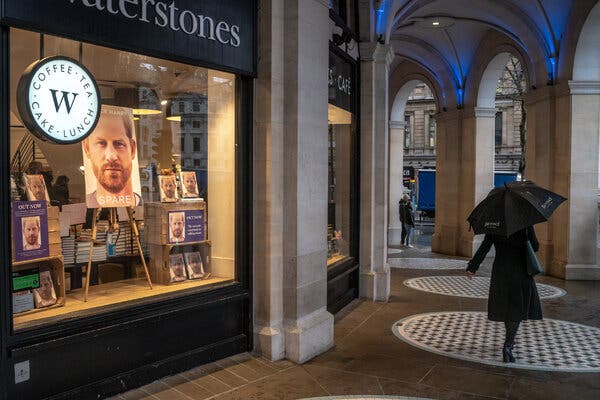In the world of royal news, few stories have stirred as much buzz as Prince Harry’s memoir, “Spare.”
Recently, Richard Osman, the renowned author known for his work on the “Thursday Murder Club,” unveiled staggering figures regarding the profits from this tell-all book.
The numbers are jaw-dropping: Harry reportedly pocketed an eye-watering £22 million, which translates to about $27 million.
It’s a sum that most people could only dream of earning in several lifetimes.
But what exactly did he earn this money for?
It seems to stem from airing the family’s dirty laundry and exposing personal family matters.
One can’t help but wonder who orchestrated this entire operation.
Many believe that Meghan Markle, Harry’s wife and a former actress with deep ties to Hollywood, played a significant role in shaping this narrative.
After all, who better than someone with experience in the entertainment industry to navigate the tricky waters of media manipulation?
Harry, who grew up shielded from the public eye, may have been ill-prepared for this level of scrutiny and publicity.
Let’s delve into the financial aspects of this deal.
Initially, Harry received a staggering £16 million advance, roughly $20 million for our American readers.
This was just part of a larger £32 million contract for a series of four books.
The prospect of even more revelations is tantalizing, leaving many to speculate about what other secrets might be revealed in future installments.
According to Osman, Harry has already recouped his advance through hardback sales alone, meaning that any revenue from the paperback edition, set to release in October 2024, will be pure profit.
This cash flow is certainly flowing straight into the Sussexes’ accounts.
However, the implications of this financial windfall extend beyond mere dollars and cents.
It raises questions about loyalty and betrayal within the royal family.
While Prince William and Catherine continue their public duties with grace and dignity, Harry and Meghan seem to be profiting from tearing down the institution that once provided them with a platform.
It’s heartbreaking to think about how William must feel, carrying on with his responsibilities while knowing his brother has shared private conversations and intimate family moments for financial gain.
The contrast between the two couples couldn’t be starker.
William and Catherine have remained silent about Harry’s revelations, choosing instead to uphold their royal duties without resorting to public drama.
Their dignified approach stands in stark contrast to the Sussexes’ calculated media strategy, which seems to revolve around maintaining a constant presence in the headlines.
It’s almost as if Meghan, with her Hollywood background, has turned their lives into a never-ending reality show.
What’s particularly frustrating is the apparent hypocrisy in Harry and Meghan’s narrative.
They claim to seek privacy and financial independence, yet they’ve become some of the most public figures, profiting from their royal connections.
The irony is palpable.
While they enjoy their lavish lifestyle in Montecito, they continue to play the victim card, perpetuating a narrative that paints them as misunderstood outsiders battling against the very institution that once embraced them.
Moreover, there’s a poignant question hanging in the air: what legacy are they leaving for their children, Archie and Lilibet?
By selling out their family’s privacy, Harry has not only exploited their grandfather’s private conversations but also jeopardized the integrity of their family bonds.
In stark contrast, William is preparing to be king, focusing on meaningful initiatives like environmental causes and mental health awareness, while Harry seems caught in a cycle of self-promotion.
As the book’s paperback version approaches release, it’s disheartening to note that it contains no new material—just a rehash of the same content.
This reinforces the notion that the memoir was never about sharing Harry’s truth but rather about generating revenue.
The timing of these releases couldn’t be worse for the royal family, especially as they navigate the loss of Queen Elizabeth and the transition of power to King Charles.
Despite the immense wealth generated from this memoir, Harry appears to remain dissatisfied, continually seeking validation and attention.
Meanwhile, William and Catherine are out there making tangible contributions to society, embodying the values of service and duty that the monarchy represents.
This stark difference highlights the ongoing struggle between the two brothers and their respective families.
The fallout from this saga is not just personal; it impacts the monarchy as a whole.
While some might argue that such exposure could tarnish the royal family, it has, in many ways, illuminated the differences between those who serve selflessly and those who prioritize personal gain.
The Sussexes may have achieved financial success, but at what cost?
They’ve sacrificed family relationships, respect, and dignity in the process.
Ultimately, the real tragedy lies in the lost potential of Harry and Meghan.
They could have been invaluable assets to the royal family, using their platform for meaningful change.
Instead, they opted for a path of self-promotion, leaving behind a trail of family betrayal and opportunism.
The question remains: what happens when the novelty of their story fades?
Without the royal connection, what do they truly have to offer?
Even amidst the chaos, William and Catherine continue to rise above it all, serving with dignity and instilling proper values in their children.
Their genuine commitment to their roles stands in stark contrast to the Sussexes’ antics, proving that no amount of money can buy true respect and admiration.
As we reflect on this unfolding drama, we must ask ourselves: what is the true price of loyalty, dignity, and family bonds?
